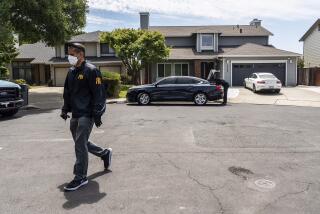Use of Detroit Police Funds Probed : Law enforcement: Inquiry seeks to determine if money was spent to pay rent on posh Beverly Hills home for chief’s daughter.
- Share via
DETROIT — In a widening scandal that has rocked the Detroit Police Department, federal investigators are probing whether cash from a million-dollar secret police fund earmarked for narcotics investigations went to pay the rent on the posh Beverly Hills home of the daughter of Detroit’s police chief.
The apparent diversion occured at a time when Detroit police were so short of cash that undercover officers were paying for street-level buys of crack cocaine out of their own pockets.
The scandal has become a major embarrassment for a city suffering under a plague of drug-related crime, where residents often complain about the police’s inability to rid their neighborhoods of crack houses and drug-dealing gangs.
A mounting public outcry over the case has led several City Council members to call for the suspension of Police Chief William Hart, who has already had control of the secret fund taken from him by Detroit Mayor Coleman A. Young.
That action came in the wake of allegations that Hart’s daughter had $72,000 in rent paid over two years on her Beverly Hills home by companies controlled by the mysterious central figure in the scandal, Kenneth Weiner, a former civilian deputy chief of police in Detroit.
Weiner’s California-based companies had contracts with the Detroit police that were paid out of the secret drug-purchase fund.
Hart has denied knowing anything about Weiner’s rent payments for his daughter, and city officials say it is still not clear whether any money from the drug-purchase fund went for the rent payments. But investigators for the FBI and the Internal Revenue Service, working with a federal grand jury, are now trying to determine exactly what happened to the money from the secret fund, and are trying to track down the elusive Weiner.
The scandal has received so much attention in the Detroit media that Stephen Markman, the U.S. attorney for Detroit, took the unusual step last week of acknowledging the existence of a federal investigation into the case.
“The circumstances of the investigation surrounding the Detroit Police Department have been extraordinary,” Markman said, in explaining why his office confirmed its probe.
A former college professor and reputed expert on anti-terrorism, Weiner served as a civilian anti-terrorism expert for the Detroit police until 1986, when a federal investigation of his allegedly questionable investment activities in suburban Detroit forced him to resign, city officials say.
Hart and Mayor Young are now seeking to distance themselves from Weiner, and agreed Monday night to turn over checks and other financial records from the secret fund that the Detroit City Council had demanded for its own investigation.
Young has refused to take Hart off active duty during the investigation. “The Mayor still stands by Chief Hart,” Bob Berg, Young’s spokesman, said. “There has been a lot of innuendo, but you are presumed innocent until you are proven guilty.”
Young blasted the local media’s coverage of the police probe last week, charging that it amounted to a “crucifixion” of Hart. On Monday, an organization of black Detroit police officers also gave their backing to Hart, charging that he had been treated unfairly by the press.
But Young’s critics on the City Council believe that the police department cannot conduct an adequate internal investigation while Hart remains on the job.
“I would prefer that Chief Hart step aside until this investigation is complete,” said Mel Ravitz, a City Council member. “I think keeping him on just raises more questions.”
Law enforcement officials say that the worst aspect of the case is that funds from the secret fund were apparently flowing to Weiner at a time when narcotics investigations on the streets of Detroit were sometimes forced to come to a virtual standstill because of a lack of funds.
In some instances last spring and summer, crews of narcotics investigators sat idle, despite rampant drug dealing throughout the city, because they could not afford any undercover work.
More to Read
Sign up for Essential California
The most important California stories and recommendations in your inbox every morning.
You may occasionally receive promotional content from the Los Angeles Times.










